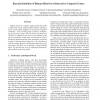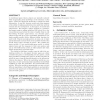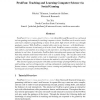45 search results - page 3 / 9 » Learning Human-Like Opponent Behavior for Interactive Comput... |
ATAL
2005
Springer
13 years 11 months ago
2005
Springer
Designing agents whose behavior challenges human players adequately is a key issue in computer games development. This work presents a novel technique, based on reinforcement lear...
CEC
2010
IEEE
13 years 6 months ago
2010
IEEE
In modern racing games programming non-player characters with believable and sophisticated behaviors is getting increasingly challenging. Recently, several works in the literature ...
ICPR
2006
IEEE
14 years 6 months ago
2006
IEEE
Modern interactive computer games provide the ability to objectively record complex human behavior, offering a variety of interesting challenges to the pattern-recognition communi...
SIGECOM
2006
ACM
13 years 11 months ago
2006
ACM
In traditional game theory, players are typically endowed with exogenously given knowledge of the structure of the game—either full omniscient knowledge or partial but fixed in...
CSEE
2011
Springer
12 years 9 months ago
2011
Springer
Pex4Fun (http://www.pexforfun.com/)from Microsoft Research is a web-based serious gaming environment for teaching computer science. Pex4Fun can be used to teach and learn computer...



